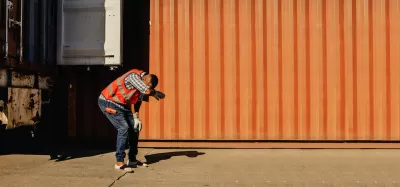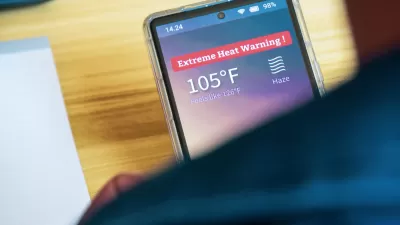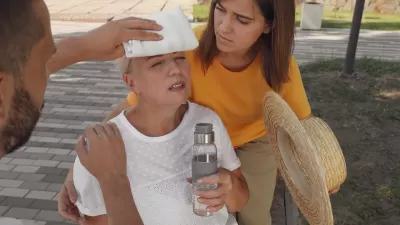Heat is associated with worsened mental health, poorer test scores, and even higher car crash rates.

Extreme heat impacts communities in more ways than we previously thought, according to new research from Boston University’s Center for Climate and Health.
In addition to the expected impacts — dehydration, heat exhaustion, and heat stroke — heat can also endanger pregnant women, impact sleep patterns, and increase irritability, depression, and suicide rates, explaims Kristin Toussaint in Fast Company. “Heat is also associated with higher rates of violence and aggression, including intimate partner violence and gun violence.”
Because of its effect on our phyisological responses, “Extreme heat also affects how well our brains work. High temperatures are associated with poorer test scores, affecting students’ academic performance—an issue that becomes even more apparent among low-income and minority students, whose schools often lack air conditioning.”
Research even shows a link between extreme heat and car crashes. “While there are physical elements at play—the sun might be in drivers eyes, for example, or tires may expand and blow out—research has linked those accidents to impaired judgment, concentration issues, slow reactions, and other driving errors.”
According to Toussaint, “In the U.S., nearly two-thirds of the population lives somewhere vulnerable to extreme summer temperatures. As human-caused climate change worsens, even more people will be exposed to extreme heat and all the health effects that come with it.” This puts extreme heat squarely in the realm of planning issues. Cities can take steps to mitigate the effects of heat, provide cooling centers for residents, and improve infrastructure to handle growing energy needs for cooling.
FULL STORY: Car crashes rise, test scores plummet: The hidden ways extreme heat affects our bodies and our minds

Manufactured Crisis: Losing the Nation’s Largest Source of Unsubsidized Affordable Housing
Manufactured housing communities have long been an affordable housing option for millions of people living in the U.S., but that affordability is disappearing rapidly. How did we get here?

Americans May Be Stuck — But Why?
Americans are moving a lot less than they once did, and that is a problem. While Yoni Applebaum, in his highly-publicized article Stuck, gets the reasons badly wrong, it's still important to ask: why are we moving so much less than before?

Research Shows More Roads = More Driving
A national study shows, once again, that increasing road supply induces additional vehicle travel, particularly over the long run.

Judge Halts Enforcement of Anti-Homeless Laws in Grants Pass
The Oregon city will be barred from enforcing two ordinances that prosecute unhoused residents until it increases capacity and accessibility at designated camping sites.

Advancing Sustainability in Los Angeles County Schools
The Los Angeles County Office of Education’s Green Schools Symposium brings together educators, students, and experts to advance sustainability in schools through innovative design, climate resilience strategies, and collaborative learning.

Using Old Oil and Gas Wells for Green Energy Storage
Penn State researchers have found that repurposing abandoned oil and gas wells for geothermal-assisted compressed-air energy storage can boost efficiency, reduce environmental risks, and support clean energy and job transitions.
Urban Design for Planners 1: Software Tools
This six-course series explores essential urban design concepts using open source software and equips planners with the tools they need to participate fully in the urban design process.
Planning for Universal Design
Learn the tools for implementing Universal Design in planning regulations.
City of Moreno Valley
Institute for Housing and Urban Development Studies (IHS)
City of Grandview
Harvard GSD Executive Education
NYU Wagner Graduate School of Public Service
City of Cambridge, Maryland
Newport County Development Council: Connect Greater Newport





























